With less than a month until the NHL trade deadline, most teams already know whether they’re buyers or sellers. Are they going to acquire players for a strong cup run? Or are they going to offload their current assets for picks and prospects in preparation for the future?
Well, the decision of whether a team is a buyer or a seller is, obviously and predominately, based on their position in the standings. Bringing in a star or trading one away is sometimes a choice that general managers are aided with.
The same can not be said at this point about the Nashville Predators, who are currently sitting outside of a playoff spot – by a sizeable amount of points – and show no overly convincing signs that they are going to turn things around. Based on their position, it appears the Predators should be sellers. But Nashville has the roster that can and should be in win-now mode.
General manager David Poile made a switch at the head coaching position and launched a somewhat wait-and-see plan, regarding whether he will be preparing for the future or acquiring players who can help propel the Predators over the top this postseason.
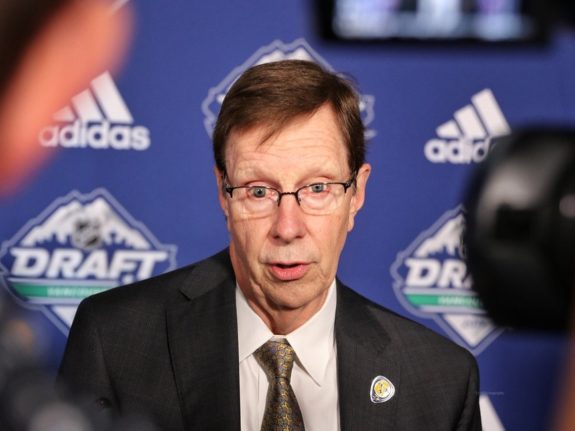
Every season there’s speculation on who could be sporting a different uniform after the deadline and this season is no different. From Sportsnet to TSN to The Hockey News, many outlets have provided who they think fans should keep an eye on from now until the deadline on Feb. 24.
Scroll through every article and you’ll spot a common theme, all three of the lists mentioned above include Predators’ players. Some more than others, but several think that Nashville could see some significant names leave the Music City before the month of February is over.
So, it seems only fitting to look at the Predators players mentioned and present the case of whether they should and shouldn’t be traded.
Craig Smith
Craig Smith’s career in Nashville could be described as somewhat frustrating. You know he’s a talented goalscorer and you know he’s top-six forward material. He’s shown that skill with five, 20-plus goal seasons, three of which were recorded consecutively. However, when the Predators need a goal, how much confidence do you really have in him?
Smith’s a player who can be hard to describe to a new fan or someone unfamiliar with the 30-year-old’s professional career. You’re not surprised if he comes through clutch in big moments, but at the same time, you’re not surprised if he completely lets you down either.
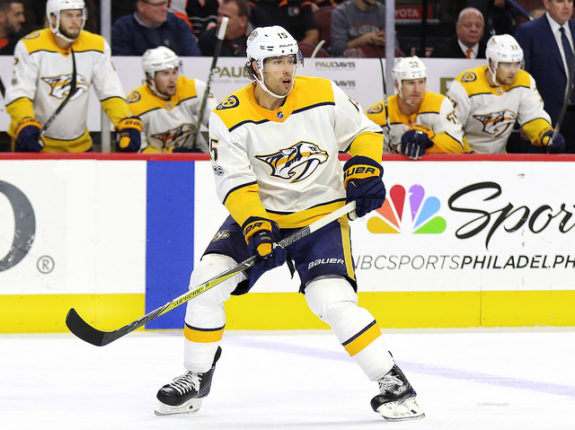
This season has been another subpar performance, similar to Smith’s 2016-17 campaign where he recorded just 29 points despite playing in 78 games. Smith is on pace for 35 points this season. Excluding the lockout-shortened 2012-13 season, only that 2016-17 season will have seen Smith produce less than this year’s projected total.
Why the Predators Should Trade Him:
Smith currently makes $4.25 million against the cap. Trading the former fourth-round pick could give the Predators some comfortability when it comes to cap space. As mentioned, Smith is fairly consistent at hitting the 20-goal mark and could fit into a lot of teams’ top-six. With the value that he could bring to a contender, trading Smith could result in a valuable return.
Finally, Smith is in the last year of his current deal, making him an unrestricted free agent (UFA) after this season. If the Predators are looking towards next season and beyond it may be better for the Poile to trade Smith for something, rather than lose him for nothing in free agency to a team willing to still pay him close to $4.5 million per season.
Why the Predators Shouldn’t Trade Him:
Frankly, many of the reasons listed above could be used as a defense to keep Smith in Nashville, as long as they’re happy paying him over $4 million in average annual value.
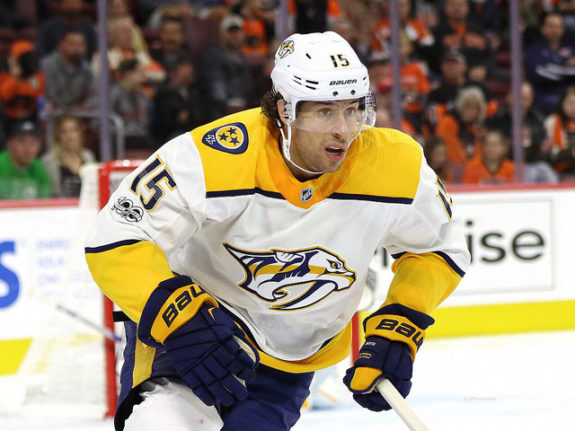
Having a player who likes to shoot the puck – he has the third most shots on the team – and a player who has the speed to create chances at any moment wouldn’t hurt, especially when cold streaks plague some of the top-forwards as seen this season.
Smith is one of the Predators more defensively-responsible forwards. During a season where the goals against have really been scrutinized, Smith has been a bright spot. Among Predators’ forwards, the former Wisconsin Badger sits second in plus/minus behind only Nick Bonino and is fourth overall, behind Roman Josi and Ryan Ellis. Can the Predators really afford to take another hit to their defensive game?
Kyle Turris
This story seems like a tale as old as time in Nashville. What’s wrong with Kyle Turris? Why can’t he produce to the scale he has for other teams? Why is he being paid so much? Could the Predators trade him?
Needless to say, Turris has had his struggles in Nashville and his salary certainly doesn’t reflect the production the Predators are receiving from him. He’s eating up a massive portion of the team’s cap space and – assuming he stays with the Predators – will continue to do so for many seasons to come. Turris’ six-year/$36 million contract still has four more seasons left after 2019-20.
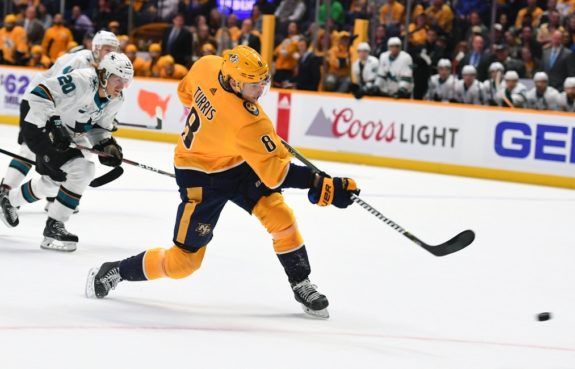
Turris occasionally shows flashes of brilliance and looks like the second center he was supposed to be. Hopes were only heightened when John Hynes took over and a new system was on the horizon. However, his consistency is non-existent. After exciting fans one game, Turris can bring them back down to earth with an uninspiring performance the very next outing.
Why the Predators Should Trade Him:
Turris has an AAV of $6 million. Only three Predators forwards (minimum 20 games) have logged less time on ice than Turris this year. He recorded 23 points last season and is on pace for 36 points this season. Enough said.
Why the Predators Shouldn’t Trade Him:
Turris is too talented to be less than a 40-point player. You must play a system conducive to your star players and Turris should be included in that group. Considering none of the Predators’ top players are having breakout seasons – other than Josi – there doesn’t seem like there’s anything to lose by changing up the game plan to get Turris in the mix. If the Predators and Turris can turn the corner, the former third-overall pick would be a great player to have on the roster.
Trading Turris would be finally admitting defeat on the 2017 trade. At a certain point you have to call it quits if it’s not working, but talk about buying high and selling low. The Predators parted ways with Samuel Girard to acquire Turris, a young offensively-minded defenseman showing a lot of potential. To think that the Predators would receive any significant return for Turris, right now, would be crazy. It would be crazier to think that the Predators would be able to offload his full salary without sweetening the deal with additional picks or players.
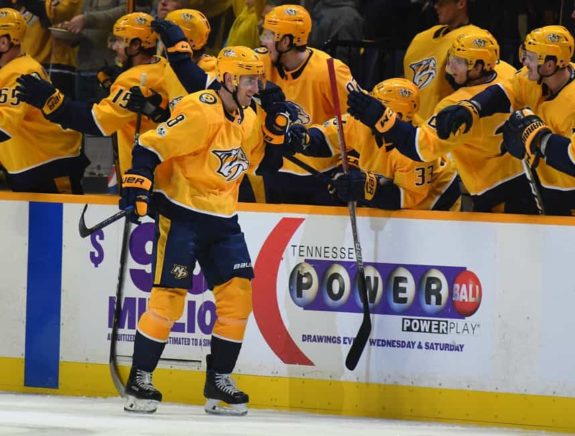
It may be worth holding on to Turris a little longer in the hopes that his trade value increases with a new voice leading the team.
Mikael Granlund
Another frustrating return on a trade that was supposedly going to increase the Predators’ offensive arsenal. Back-to-back seasons of 69 and 67 points and Mikael Granlund was on pace for another monster season before being traded to Nashville. But as soon as Granlund swapped Minnesota Wild green for Predators gold his point production fell off a cliff.
It was a tumultuous trade deadline for Granlund last season. He was expecting the birth of his first child, with his fiancée still in Minnesota. Granlund only mustered one goal and four assists in the 16 regular-season games he played for the Predators last year. His five points were disappointing, but understandable considering the circumstances.
However, despite having a fresh slate and time to adjust to life with a new team, the results still haven’t arrived. Granlund is on pace for 32 points this season, which would be the lowest total of his NHL career, excluding his 2012-13 season where he only laced up for 27 games.
Why the Predators Should Trade Him:
Right now, Granlund still has a lot of value, his resume shows that he’s an elite scorer. Just because it didn’t work out in Nashville doesn’t mean that he’s a lost cause, and that logic may be enough for a contending team to make an offer for the pending UFA.
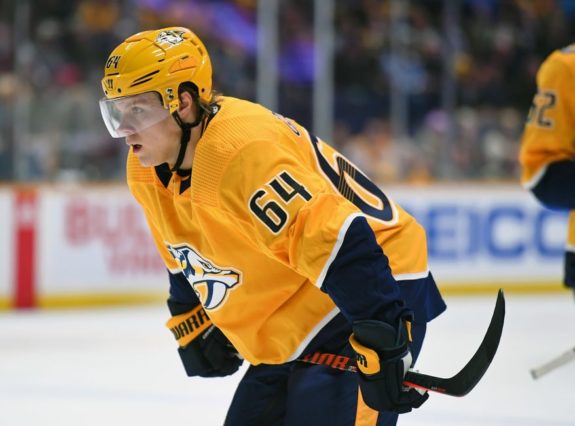
This is another case of trade him for something now, or risk losing him for nothing in free agency during the summer. Considering Granlund’s career has taken a significant slide since arriving in Nashville, it may be extremely difficult to sell him on coming back during the offseason.
Undoubtedly, the Predators don’t want to pay just under $6 million AAV for 30 points. Like Turris, Granlund could turn a corner. But there haven’t been many signs that he’s a fit for the Predators, so when is it time to end the failed experiment?
Why the Predators Shouldn’t Trade Him:
To start the season there seemed to an unbelievable chemistry with Granlund, Forsberg and Duchene. It was that line combination that sparked the thought that Duchene might have a Hart Memorial Trophy-worthy type season, he had nine points in his first five games, while Forsberg started the season with 15 points through his first 12 games. You have to wonder whether the Predators are a small tweak away from unleashing Granlund’s potential, and because of that it may be a big gamble to give up on the Finn.
Granlund was a top-10 pick in the 2010 NHL Entry Draft and for good reason. If Hynes can get the Granlund that was seen in Minnesota, then trading Kevin Fiala for him seems like more Poile mastery.
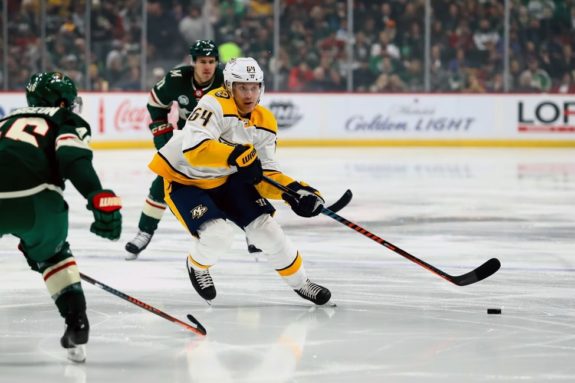
These are all massive ‘ifs,’ and all of them must come to fruition for it to make sense to keep Granlund.
Nick Bonino
This may be the most puzzling of the bunch considering the player that Nick Bonino has been for the Predators this season. Nevertheless, he made Sportsnet’s list as a potential player who could be on the move.
Bonino is like a Swiss Army Knife, he’s an excellent utility player and maybe that’s why he made the list. When the Predators need a penalty killed, they send out Bonino and in the last few minutes of a one-goal game, they send out Bonino. With his 14 goals – tied for second-most on the team – when they need a goal, the Predators can send out Bonino.
What contending team wouldn’t want Bonino? He’s built for the playoffs, heck he won two consecutive cups in Pittsburgh. When it comes to experience, Bonino has it, he knows what a winning team looks like and most importantly, what it takes to be a member of one.
Why the Predators Should Trade Him:
He might have the most value of all the players that the Predators could reasonably part with. Bonino could be an “x-factor” for many teams. The two-time Stanley Cup champion could upgrade a team from one that makes a deep postseason run to one that lifts the cup at the end of it. With that potential, trading Bonino could yield high returns for the Predators, especially with the right businessman at the helm of the discussions, enter David Poile.
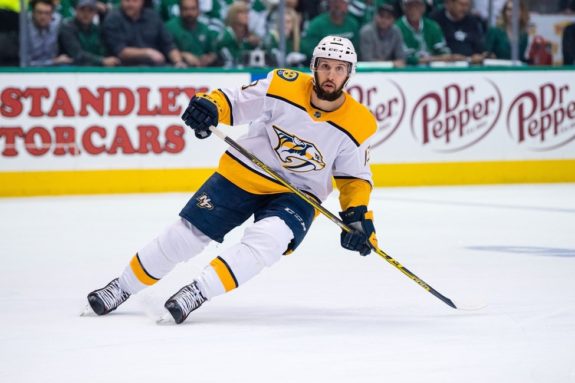
Season after season, Predators fans have seen their first-round pick traded for a rental player, with the hopes of putting the Predators over the top. Maybe this is the season where the roles are reversed. Could Poile fetch a first-round selection for Bonino? It seems like a bit of a stretch, after all, we’re in an age where high draft picks are worth their weight in gold.
But the market dictates value and Bonino is worth whatever a team is willing to pay. TSN has speculated that the Carolina Hurricanes are willing to use their first-round pick in negotiations. Maybe GM Don Waddell sees first-round value in pairing a playoff veteran with the young talent they have in Raleigh. If that is the case, then it’s certainly something that the Predators would have to consider.
Why the Predators Shouldn’t Trade Him:
Bonino still has another year left on his four-year deal. Regardless of what has happened this season, the Predators’ window is still wide open and will be next season. If they want a shot at finally lifting the ultimate prize, Bonino will be key piece. The native of Hartford, Connecticut is one of the best defensive forwards the Predators have, his faceoff skills and defensive awareness may be unmatched.
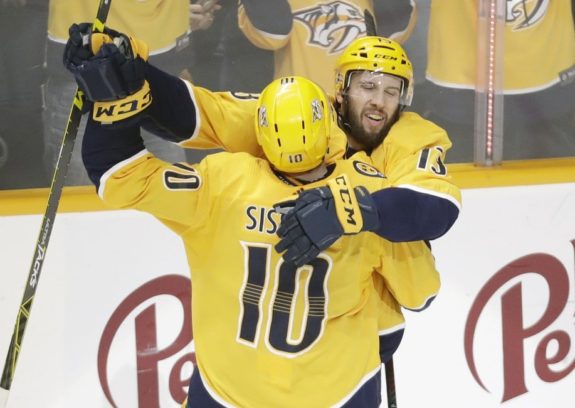
The Predators still see themselves as playoff contenders. A Bonino team has beat the Predators in the playoffs once already, why risk it happening again?
Trading Bonino would make a massive statement. The team would be officially acknowledging that this inexplicably disastrous season has been a failure. But, at the point of trading Bonino, the Predators could be so far out of it, the statement of the trade might just be a move that states the obvious.
There’s lots of hockey left to be played and the Predators do have games in hand over a lot of teams they’re chasing. It’s not unrealistic for the Predators to pivot themselves into a position where they are buyers once again.
After the Predators made their run to the Stanley Cup Final in 2017, the team pleaded with Poile to keep the “band together” and he did. Since then Poile has made limited adjustments and the team still looks the same for the most part. However, if the Predators remain stuck in their ways, the band may have played their last tune together and they will not be called for an encore.